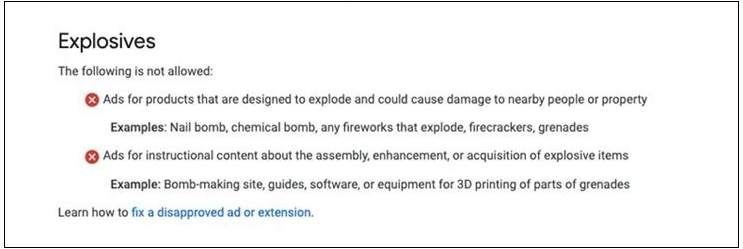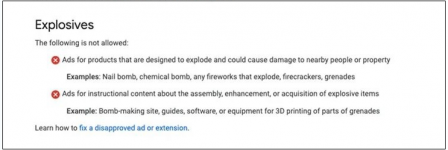Getting banned from Google Ads can happen to anyone, including experienced affiliate marketers. Sometimes it's because of serious rule violations, but other times it can just be a small mistake. In this article, the YeezyPay team, which assists people in accessing reliable Google Ads agency accounts, will explain how to successfully appeal a ban, when it's worth making the effort, and when it might not be possible to get your account back.

Some of the most common reasons for bans include:
Suspicious Payments: This type of ban occurs when Google questions the integrity of your payment methods. Here are several actions that might lead to a "Suspicious Payments" ban:
Circumventing Systems: This refers to attempts to circumvent Google’s advertising policies or guidelines. This might include using tricks or loopholes to get around restrictions, which can lead to a ban. This is a more serious reason for a ban, as it suggests that Google believes you are trying to deceive them. Here are some actions that could lead to a "Circumventing Systems" ban:

If your account is banned for "Suspicious Payments," you have a good chance (between 60% to 90%) of recovering it. However, if the reason for the ban is "Circumventing Systems," your chances of getting your account back are significantly lower, as Google has already classified your actions as dishonest.
In addition to "Suspicious Payments" and "Circumventing Systems," there are several other issues that can lead to your Google Ads account being banned. It’s important to be aware of these issues to maintain a good standing. Here are some of the main problems that can result in a ban:
Malicious or Unwanted Software
This issue refers to harmful software that can compromise the security of users. Here are specific actions that can lead to a ban related to malware:
If the domain, code or content of your website or landing page shows signs of being tampered with or compromised in any way, it can lead to serious consequences.
Here are some factors that can cause issues:
If you are promoting services related to official documents or government matters, you need to tread carefully. Here are some common mistakes in this area:
Certain business practices are strictly prohibited and can lead to a ban. Here are some examples:

When you write your appeal, keep these important tips in mind:

Getting your ban lifted may not happen right away. You might need to appeal multiple times. The key is to demonstrate that your account is trustworthy. However affiliates who use accounts that are associated with professional agencies typically have a better chance of success, as these agencies can help prepare appeals and communicate directly with Google. If you are an affiliate, media buyer, or advertiser working with Google Ads, you can access these kinds of Google Ads agency accounts through YeezyPay.
If your first appeal is unsuccessful, avoid overwhelming Google with appeals. Wait 1 to 2 days before submitting a second appeal, and then another few days for the third. If you still don’t receive a response, wait a week before trying one last time.
The outcome of your appeal will depend on your account’s history and the specific type of ban you received. If your account has a positive history, it may improve your chances of getting the ban lifted.
Using trusted agency accounts can also increase your chances of success. The agencies that provide these accounts have experience in handling disputes with Google Ads, which may strengthen your case. YeezyPay offers access to such agency accounts and will always support you during the appeal process whenever your ad accounts get banned.
Why does Google ban ad accounts?
Google can ban accounts for various reasons. Bans don't just happen for accounts running grayhat or blackhat campaigns; they can also occur for accounts that promote whitehat offers. When you get banned, the notification you receive typically doesn’t explain the exact reason for the ban. Instead, it gives you general categories that describe the issues.Some of the most common reasons for bans include:
Suspicious Payments: This type of ban occurs when Google questions the integrity of your payment methods. Here are several actions that might lead to a "Suspicious Payments" ban:
- Using a foreign card: If you use a credit or debit card from another country that doesn’t match your account’s location, it can raise red flags.
- Linking a previously banned card: Paying with a card that has been associated with an account that was banned can trigger suspicion.
- Large deposits into new accounts: If you deposit a large amount of money into a new account that hasn’t been active for long, Google may question the source of those funds.
- Errors in card information: Simple mistakes, like entering the wrong card number or expiration date, can lead to issues.
- Linking to debt-associated cards: If you connect a card that has outstanding debts on other platforms, like Facebook, it may raise concerns.
- Problems with automatic payments: Issues such as missed payments or failed transactions can contribute to this type of ban.
Circumventing Systems: This refers to attempts to circumvent Google’s advertising policies or guidelines. This might include using tricks or loopholes to get around restrictions, which can lead to a ban. This is a more serious reason for a ban, as it suggests that Google believes you are trying to deceive them. Here are some actions that could lead to a "Circumventing Systems" ban:
- Changing approved ads: If you make modifications to your ads after they have been approved that violate Google’s policies—like adding prohibited items—this can result in a ban.
- Misleading information: Providing false or misleading information to users, such as changing product names or faking data, can lead to serious consequences.
- Advertising prohibited products: Promoting items that are not allowed, such as unlicensed medications or weapons, is a clear violation of Google’s rules.
- Using virtual credit cards with automatic payments: Combining virtual cards with automatic payment methods can create complications that might trigger a ban.
- Repeated payment failures: If your account has a history of failed payments, it can make Google suspicious about your payment practices.
- Low-quality images or price manipulation: Using poor-quality images or drastically lowering product prices may suggest that you are trying to sell counterfeit goods, which can also lead to a ban.
If your account is banned for "Suspicious Payments," you have a good chance (between 60% to 90%) of recovering it. However, if the reason for the ban is "Circumventing Systems," your chances of getting your account back are significantly lower, as Google has already classified your actions as dishonest.
In addition to "Suspicious Payments" and "Circumventing Systems," there are several other issues that can lead to your Google Ads account being banned. It’s important to be aware of these issues to maintain a good standing. Here are some of the main problems that can result in a ban:
Malicious or Unwanted Software
This issue refers to harmful software that can compromise the security of users. Here are specific actions that can lead to a ban related to malware:
- Suspicious links or files: If your ads or landing pages contain links or files that appear unsafe or questionable, Google may flag your account. This includes links that lead to harmful websites or downloads.
- Association with infected websites: If your website is linked to or associated with other sites known for hosting malware, it can reflect poorly on your account and lead to a ban.
- Cheap domains and phishing websites: Using low-quality domains or websites that look like they are trying to trick users (phishing) can raise suspicions. If your website has a negative reputation or a history of deceitful practices, it may be banned.
If the domain, code or content of your website or landing page shows signs of being tampered with or compromised in any way, it can lead to serious consequences.
Here are some factors that can cause issues:
- Suspicious new domains: Registering a new domain that appears unreliable or suspicious can raise red flags for Google.
- Content mismatch: If the content on your site does not match what Google has indexed (what Google believes your site is about), it can lead to confusion and possible bans.
- Malicious code: If your website contains harmful code that can infect users’ devices, it can trigger a ban.
- Forced redirects: Forcing users to be redirected to other sites without their consent is considered deceptive and can lead to a ban.
- Vulnerabilities in your website: If there are weaknesses in your content management system (CMS) or hosting service that could be exploited by hackers, this can also result in a ban.
If you are promoting services related to official documents or government matters, you need to tread carefully. Here are some common mistakes in this area:
- Choosing the wrong category: Selecting an incorrect category for your service can create confusion and lead to a potential ban.
- Lacking necessary certifications: If your service requires specific approvals or certifications and you do not have them, this could result in issues with your account.
- Errors in your ads or landing pages: Mistakes in your advertisements or problems with your landing page can make your services appear untrustworthy, leading to a ban.
Certain business practices are strictly prohibited and can lead to a ban. Here are some examples:
- Promoting prohibited goods or services: If you advertise items or services that are not allowed such as illegal products can result in immediate account termination.
- Fraud: Engaging in scams or deceptive practices will almost certainly lead to a ban.
- Misrepresenting facts: Providing false or misleading information about your products or services can also result in a ban.
- Unauthorized promotion methods: Using promotional methods that Google has not approved can lead to issues with your account.
- Incorrect use of brand names: Misusing brand names or trademarks in a way that could confuse users or mislead them can result in account bans.
How to properly appeal a ban
If your Google Ads account gets banned, your chances of getting it reinstated depend on several important factors:- Account age: Your account should be at least a week old. This shows that you’ve established a presence and are serious about using the platform.
- Proxy changes: Frequent changes can raise red flags. Try to limit how often you change your proxies.
- Agency account: Having a trusted agency account helps. These accounts have proven history with Google Ads and are usually treated leniently regarding bans.
When you write your appeal, keep these important tips in mind:
- Be polite: Remember that real people review appeals, not automated systems. Even if you believe the ban was unfair, be respectful in your communication. Mention that you have had no previous violations and explain how the ban is affecting your business. If this isn’t your first ban, it’s better not to mention past issues.
- Use a different language: If you want a quicker response, consider writing your appeal in a language other than English. Languages like Spanish or French may be more effective, as accounts from these regions are banned less frequently.
- Provide correct contact information: Ensure you write the appeal under the name associated with your payment method. Include your email for responses, and if you’re using a different email, provide the billing email as a copy.
- Include a real phone number: Ideally, this should be linked to your account. Moderators may call to clarify details or provide updates on your appeal.
- Specify the right account: If you have multiple accounts, make sure to enter the ID of the banned account, not the manager’s account.
- Country of payment: Indicate the country that matches your payment profile. For instance, if you pay from the USA but advertise in Brazil, list the USA.
- Choose key terms wisely: Use keywords that received the most spending and traffic in your ads.
- Complete the form: Fill out every section of the appeal form, including optional fields, as Google often reviews these first.
- Be specific: Describe the issue in detail, as if you were explaining it to a friend. Avoid using generic templates you find online. Aim for at least 500 characters in your explanation.
- Ownership of payment method: Clearly state that the card you used for payments belongs to you.
- Attach evidence: Include 3 to 5 screenshots that support your case. This visual evidence can strengthen your appeal.
- Suspicious payments: Confirm that your account ID matches the information on file and that the card is indeed yours.
- Malicious or Unwanted Software: Assure the reviewers that your website is safe and that you have checked it using Google Search Console.
- Compromised site: State that you’ve scanned for viruses, removed any threats, and updated necessary plugins.
- Government Documents and Official Services: Explain that your ads and landing pages comply with Google’s rules and that you have the necessary certifications.
- Unacceptable business practices: Confirm that your ads and landing pages adhere to Google’s policies and that you’ve made the necessary changes.
Getting your ban lifted may not happen right away. You might need to appeal multiple times. The key is to demonstrate that your account is trustworthy. However affiliates who use accounts that are associated with professional agencies typically have a better chance of success, as these agencies can help prepare appeals and communicate directly with Google. If you are an affiliate, media buyer, or advertiser working with Google Ads, you can access these kinds of Google Ads agency accounts through YeezyPay.
If your first appeal is unsuccessful, avoid overwhelming Google with appeals. Wait 1 to 2 days before submitting a second appeal, and then another few days for the third. If you still don’t receive a response, wait a week before trying one last time.
Conclusions
Appealing Google Ads account bans isn’t always easy, but it is possible. You need to prepare properly, be patient, draft your appeal accurately, and submit it in a timely manner.The outcome of your appeal will depend on your account’s history and the specific type of ban you received. If your account has a positive history, it may improve your chances of getting the ban lifted.
Using trusted agency accounts can also increase your chances of success. The agencies that provide these accounts have experience in handling disputes with Google Ads, which may strengthen your case. YeezyPay offers access to such agency accounts and will always support you during the appeal process whenever your ad accounts get banned.




